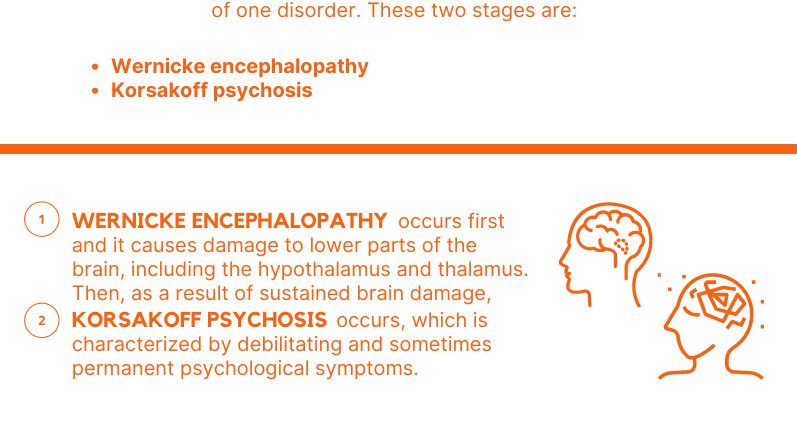Contents
Korsakoff syndrome: causes, symptoms and consequences
Sergei Korsakoff. At the end of the 19th century, this Russian neuropsychiatrist was the first to describe the disorganization of memory linked to the syndrome that will bear his name. “It is the terminal form, the most severe of cognitive disorders encountered in chronic alcoholism,” explains Dr Michael Bazin, head of the addiction unit at the Center hospitalier d’Allauch.
What is Korsakoff syndrome?
Risk factor for many cancers, cardiovascular diseases: alcohol does not have a good reputation in health, and rightly so. It is responsible for more than 200 diseases and various illnesses. It is one of the main preventable causes of death: it is attributed 41.000 deaths per year.
Among all the damage it causes, there is one organ that particularly suffers: the brain. “Alcoholism is a time bomb for the brain,” laments Dr. Bazin. “It is one of the major causes of premature dementia, before the age of 65. The earlier consumption begins, the greater the deterioration of the brain. The 2017 health barometer of Public Health France indicated that while 13,5% of adults never drink, 10% drink every day.
“Alcohol is a maximum of two glasses a day, and not every day”, such is the slogan summarizing the new consumption benchmarks established by Public Health France and the National Cancer Institute. As a reminder, a standard glass of alcohol = 10cl of wine = 2,5cl of pastis = 10cl of champagne = 25cl of beer. Women who are planning to become pregnant, who are pregnant or breastfeeding must, for their part, refrain from any consumption.
Causes of Korsakoff syndrome
This neurological disorder is multifactorial, but “the main cause is a deficiency of vitamin B1 (thiamine), which creates neuronal stress. Chronic alcoholism in particular causes a disturbance in the absorption of this vitamin, which the brain needs to function properly. However, it is not synthesized by the body and must be provided by food (it is found in cereals, nuts, dried beans, meat, etc.).
An entire region of the brain – the memory circuit – is affected. This deficiency is in most cases the consequence of chronic alcoholism. More rarely, it was triggered by severe malnutrition, head trauma, or a sequel to Gayet-Wernicke encephalopathy, untreated or treated too late.
Symptoms of Korsakoff syndrome
Anterograde amnesia
“There are big memory problems. We are talking about anterograde amnesia. The patient is unable to remember what happened a few minutes earlier. He can remember his distant past – not always, but recent events completely escape him. “To compensate for this big memory deficit, he will fabulate, that is to say invent stories. “
False recognition
This allows people to chat with loved ones in a seemingly consistent way. “False recognition is another sign of illness. The patient thinks he knows who he is talking to ”, even if he has never seen him. “Gait and balance disorders, disorientation in time and space complete the clinical picture. “
Mood disorders
The person generally no longer knows where they are, and no longer knows the date. Mood disorders are also mentioned. Finally, “the patients are not aware of their condition. This is called anosognosia. This symptom is frequent in Alzheimer’s patients, who “forget that they are forgetting. The handicap is very heavy, and permanent.
Diagnosis of Korsakoff syndrome
“It is based on the clinical examination. The doctor notes the presence or not of the main symptoms of Korsakoff:
- severe anterograde amnesia,
- walking and balance disorders,
- the fabulations,
- and false recognition.
Treatment of Korsakoff syndrome
Stopping alcohol, complete and definitive, is of course essential. Weaning should be carried out in a specialized establishment. Some Continuing Care and Rehabilitation (SSR) centers have a neuro-addictology unit, specializing in this disorder. There is no cure for Korsakoff syndrome. Abstinence unfortunately does not allow us to find what has been lost, but prevents the patient’s condition from deteriorating even further. It is accompanied by a “vitamin B1 refill. »The injections can be given intravenously or intramuscularly. The treatment is often long, over several months. At the same time, it is also recommended to find a balanced diet.
“In the addiction center, we see patients before they are at the stage of Korsakoff syndrome. When it comes to that, the brain damage is irreversible. You cannot restore what has been lost. But it is still possible to help these patients to wean themselves, to re-educate themselves in walking, to adapt – thanks to occupational therapy – their environment to their remaining resources. ”










